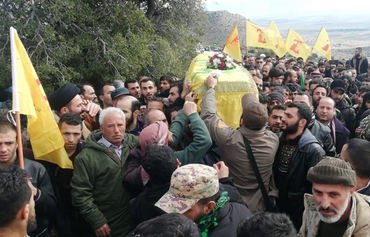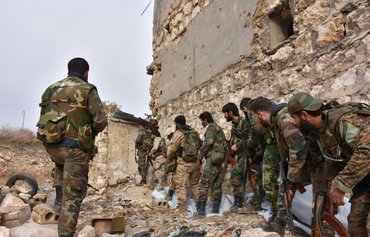Hizbullah recently sent a new batch of fighters to Syria to bolster regime and allied forces in the battle for Aleppo, and later Idlib, in what appears to be an attempt to influence the endgame in favour of the regime, military experts said.
Hizbullah leader Hassan Nasrallah has said on more than one occasion that the battle in Aleppo province is the biggest strategic battle in the Syrian conflict.
"We have a responsibility to increase our presence in Aleppo and we will do that," he said on the June 24th 40th day commemoration following the death of Hizbullah military commander Mustafa Badreddine in Syria.
"Our numbers in Aleppo are significant, rather than small," Nasrallah had said.
Analysts speaking with Al-Mashareq said the Syrian and Iranian regimes are hoping to take advantage of the situation in Aleppo to increase the participation of Hizbullah fighters in the conflict, and end the war in their favour.
They also warned that Hizbullah's growing presence in Syria, specifically in the battle for Aleppo, will ignite sectarian strife in the whole region.
Fighting a proxy war
There have been reports that the party is moving 4,000 of its Lebanese fighters from al-Qusayr -- where it has a military base just across the border from the Lebanese town of al-Hermel -- to other destinations in Syria, said security and strategy analyst Brig. Gen. Naji Malaeb, who is retired from the Lebanese army.
Fighting is taking place within the city and its neighbourhoods, he said, adding that Hizbullah is used to this type of street fighting and is gearing up for it using its Lebanese and Syrian fighters.
The militia's latest mobilisation in Aleppo is an attempt to influence the final settlement of the Syrian war in the regime's favour, he said.
Hizbullah is fighting a proxy war "on behalf of the Syrian regime" and its Iranian ally, he said, so that they do not appear as non-compliant with the International Criminal Court restrictions on the use of excessive violence in military conflicts.
The group aims to use excessive violence in Aleppo to make up for the big losses the Syrian army sustained in its ranks, Malaeb explained.
"The group is mobilising its fighters for battle under the supervision of Iran's Islamic Revolutionary Guard Corps (IRGC), but they will not be able to gain victory," he added.
Ongoing involvement in Syria
"It goes without saying that Hizbullah gives priority to the Aleppo battle, and this is evident in positions that [Nasrallah] takes," political analyst Ali al-Amin told Al-Mashareq.
These include the party's on-the-ground presence, "which has resulted in a large number of fallen fighters ", he said.
Hizbullah's primary goal is to boost its popularity and the morale of its fighters after suffering heavy losses in battle, as well as to psychologically prepare its popular base for ongoing involvement in the Syrian war , al-Amin said.
The party has emphasised its "large scale involvement in the confrontation in Syria and particularly in Aleppo", he said, noting that it engages in battles under the supervision of the IRGC.
Hizbullah has brought new fighters into its ranks, he said, due to losses it incurred in several locations and the death of several senior commanders.
"For this reason, the new fighters are the group’s main force as they prepare for the battle of Aleppo," he added, noting that the party is seeking more fighters due to its "commitment to engagement in the fighting in Syria".
There are no specific figures about how many fighters are in the party's ranks, he said, as "Hizbullah never reveals the number of its fighters" or its dead.
Hizbullah has boosted its preparedness and numbers as its central command has deemed that a military intervention in Aleppo is necessary, due to "its pivotal significance", said strategy analyst Brig. Gen. Richard Dagher, a retired Lebanese military officer.
Igniting sectarian tensions
"Hizbullah and its backers are trying to take advantage of the overtime in this battle by engaging in what is left of the fighting in the neighbourhoods of eastern Aleppo," he told Al-Mashareq.
This is not easy, however, because these neighbourhoods are stretched over a wide area, he said, with a population of approximately half a million people, including both moderate and extremist opposition groups.
Due to the party's nature "as a militia rather than an official state actor that is bound by the rules of war", he said, the Syrian regime and its allies are using Hizbullah to further their own agenda.
"Because Hizbullah no longer cares about the official Lebanese stance against its interference in Syria over the past four years , its role in the war in Syria, especially in Aleppo, will ignite sectarian strife in the region as a whole," Dagher said.
"If Hizbullah seizes eastern Aleppo, we will see reactions in Syria, Lebanon and the region," he said.

![Supporters of Lebanon's Hizbullah attend the November 5th funeral in Beirut of a fighter killed in combat alongside regime forces in Syria. [Stringer/AFP]](/cnmi_am/images/2016/12/06/6694-Lebanon-Beirut-Hizbullah-600_384.jpg)






